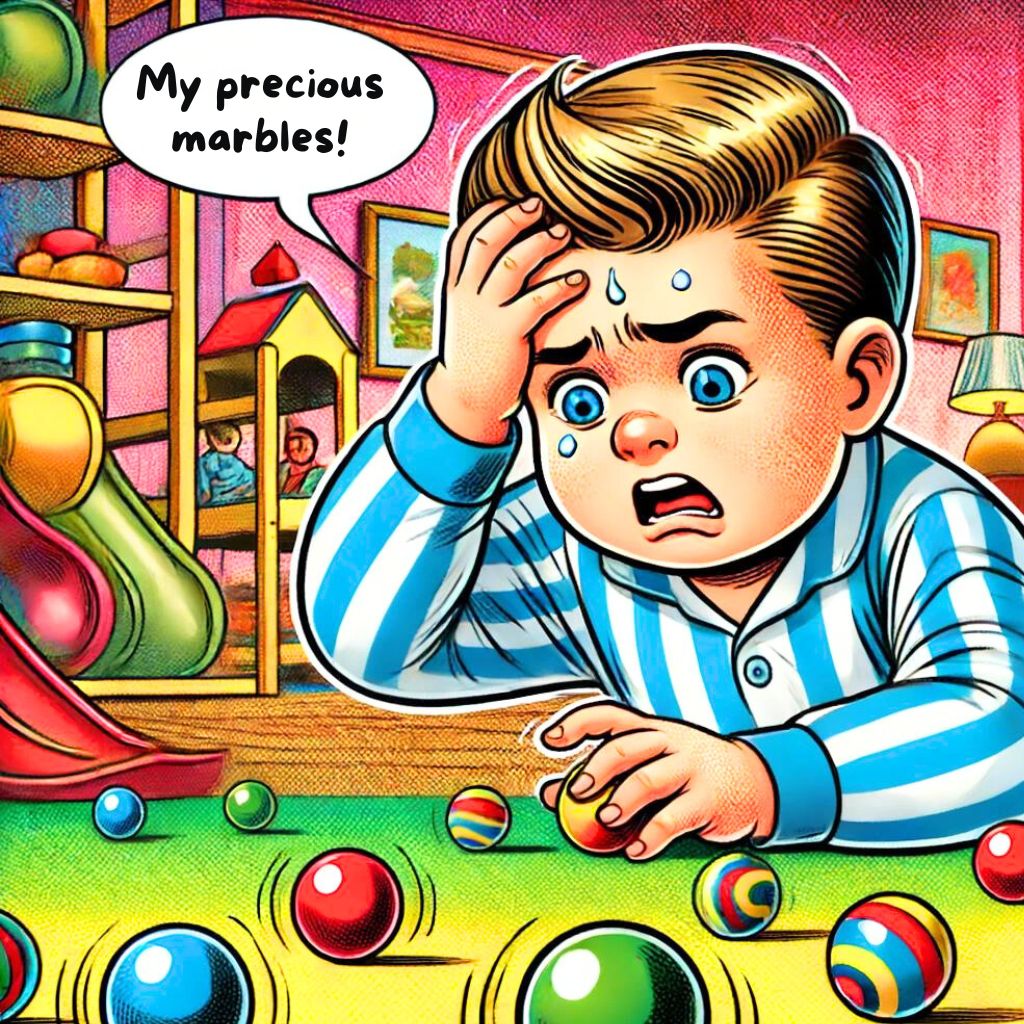We all have those moments when we feel like we’re losing control, and our language is packed with colorful ways to describe them.
These vivid idioms, each with its own fascinating backstory, bring our emotions to life and make our conversations more interesting. Curious about where these phrases come from and how they became part of our daily talk?
Let’s explore the fascinating world of expressions that capture what it’s like to go a little CRAZY!
1. Lose one’s marbles
“Lose one’s marbles” means to become insane or mentally unstable.
The phrase “lose one’s marbles” has a playful origin from the late 19th century, likely referring to the popular children’s game of marbles. Losing your marbles meant losing something precious, symbolizing losing one’s sanity.
However, the exact etymology of “lose one’s marbles” remains somewhat unclear, as is often the case with idiomatic expressions. However, it’s certainly an intriguing phrase. For a more in-depth discussion on its origins, you can explore further here
Imagine someone working non-stop for weeks without a break. They start to forget simple things and act erratically, feeling like they are losing their marbles.
Example Sentences:
Example 1: After working 16-hour days for a month straight, she felt like she was losing her marbles.
Example 2: He started talking to his plants, and his neighbors thought he had lost his marbles.
2. Go bananas
“Go bananas” means to get extremely excited or crazy.
This funny idiom, which gained popularity in the mid-20th century, likely emerged from American slang. “Bananas” was chosen for its humorous and whimsical sound, making it a fun way to describe going wild.
Picture a sports fan whose team wins the championship. They jump, scream, and dance in joy, perfectly illustrating what it means to go bananas.
Example Sentences:
Example 1: The kids went bananas when they heard they were going to Disneyland.
Example 2: He went bananas after scoring the winning goal in the final seconds of the match.
3. Off one’s rocker
“Off one’s rocker” means to be mentally unstable or crazy.
This idiom paints a vivid picture. It comes from the idea of someone falling off a rocking chair, which was a sign of instability. It’s been a part of the English language since the late 1800s.
Think of a person who leaves a stable job to chase a wild dream. Their friends might say they’re off their rocker for taking such a huge risk.
Example Sentences:
Example 1: His decision to sell everything and move to a remote island made everyone think he was off his rocker.
Example 2: She must be off her rocker to spend all her savings on lottery tickets.
4. Go nuts
“Go nuts” means to become very excited or crazy.
The idiom “go nuts” has an intriguing history that dates back to the early 20th century. The term “nuts” as slang for “crazy” or “insane” has been used since the mid-19th century.
One theory is that “nuts” derives from the metaphorical use of “nut” to mean “head.” If someone is “off their nut,” it means they are out of their mind or insane.
This usage reflects a comparison between a person’s head and a nut, implying that if the nut is cracked or damaged, so is the person’s sanity.
Another explanation is that “nuts” evolved from the term “nutty,” which was used in the 18th century to describe someone extremely fond or infatuated, often to the point of irrationality. Over time, the word transitioned to signify craziness or extreme behavior more broadly.
Imagine a sports fan at the final game of the season. The fan jumps up, screams, and celebrates wildly when their team scores the winning goal. This intense excitement and over-the-top reaction are perfect examples of going nuts.
Example Sentences:
Example 1: The crowd went nuts when the band played their hit song.
Example 2: He went nuts when he found out he had won the grand prize in the lottery.
5. Flip one’s lid
“Flip one’s lid” means to become very angry or upset.
The imagery here is quite vivid. Think of a pot boiling over and the lid flipping off. This idiom has been around since the early 20th century.
Consider someone who finds out their new car was scratched. Their immediate, intense anger is a classic example of flipping one’s lid.
Example Sentences:
Example 1: She flipped her lid when she saw the mess in her newly cleaned kitchen.
Example 2: He flipped his lid after discovering that his coworker took credit for his work.
6. Fly off the handle
“Fly off the handle” means to become very angry suddenly.
This idiom dates back to the 19th century and comes from the image of an axe head flying off its handle, which was sudden and dangerous.
Think of someone who receives bad news unexpectedly and starts shouting. This sudden burst of anger perfectly illustrates flying off the handle.
Example Sentences:
Example 1: He flew off the handle when he found out his flight was canceled.
Example 2: She flew off the handle when her assistant failed to complete the task on time.
7. Go berserk
“Go berserk” means to become extremely enraged and out of control.
The word “berserk” comes from Old Norse “berserkr,” which refers to warriors who fought with wild, uncontrolled fury (see the featured image of this article).
Picture a person who discovers their house has been vandalized. Their uncontrollable rage is a prime example of going berserk.
Example Sentences:
Example 1: He went berserk when he saw the damage to his car.
Example 2: The fans went berserk when their team lost in the game’s final seconds.
8. Blow one’s top
“Blow one’s top” means to lose one’s temper.
This idiom draws from the image of a steam engine under too much pressure, with the top blowing off.
Imagine a manager who learns that a critical project has failed due to carelessness. They might blow their top, expressing their frustration loudly.
Example Sentences:
Example 1: He blew his top when he found out he was fired from his job.
Example 2: She blew her top when she saw the mess her kids made.
9. Go ballistic
“Go ballistic” means to become very angry or lose control of one’s emotions.
This idiom comes from the term “ballistic,” describing the flight of projectiles. It implies explosive anger.
Think of someone who discovers they’ve been betrayed. Their immediate, intense rage is an example of going ballistic.
Example Sentences:
Example 1: She went ballistic when she found out he cheated on her.
Example 2: He went ballistic when he saw the huge dent in his new car.
10. Go haywire
“Go haywire” means to become chaotic or malfunction.
This idiom stems from haywire, a wire used to bind hay bales. When things went wrong, the wire would become tangled and unmanageable.
Imagine a computer system that crashes and causes all sorts of problems. The situation becomes chaotic, described perfectly by “go haywire.”
Example Sentences:
Example 1: The computer system went haywire and crashed.
Example 2: Everything went haywire during the event, with equipment failures and miscommunications.
11. Go bonkers
“Go bonkers” means to go frantic, impatient, or crazy.
Although the origin of this idiom is not entirely clear, it has been American slang since the early 20th century.
Picture someone who gets incredibly excited about a surprise party. Their over-the-top reaction shows what it means to go bonkers.
Example Sentences:
Example 1: She went bonkers when she won the lottery.
Example 2: The kids went bonkers when they saw the new puppy.
12. Freak out
“Freak out” means to become very upset or scared.
This idiom, popular since the 1960s, comes from the slang term “freak” to describe someone who behaves wildly.
Imagine someone encountering a large spider in their bedroom. Their intense reaction is a perfect example of freaking out.
Example Sentences:
Example 1: She freaked out when she saw the spider.
Example 2: He freaked out when he realized he had lost his wallet.
13. Hit the roof
“Hit the roof” means to become very angry.
This idiom likely comes from the image of someone jumping up in anger so forcefully that they hit the roof.
Consider a parent who finds out their child has been lying. Their immediate, intense anger is what it means to hit the roof.
Example Sentences:
Example 1: He hit the roof when he saw the bill.
Example 2: She hit the roof when she found out her car was towed.
14. Go mental
“Go mental” means to get exceedingly irritated or agitated.
This idiom comes from British slang, where “mental” describes someone acting irrationally.
Think of a teenager who gets grounded unfairly. They might go mental, yelling and slamming doors in frustration.
Example Sentences:
Example 1: He went mental when he found out his flight was canceled.
Example 2: She went mental when her brother broke her favorite vase.
15. Blow a gasket
“Blow a gasket” means to flare in rage or fury.
This idiom comes from car engines, where a gasket can blow under high pressure, causing the engine to fail.
Think of someone who finds out their partner has been unfaithful. Their immediate, explosive anger is a prime example of blowing a gasket.
Example Sentences:
Example 1: When Rahul realized he’d lost his bet money, he blew a gasket.
Example 2: She blew a gasket when she discovered the kids had drawn on the walls.
16. Have bats in the belfry
“Have bats in the belfry” means to be eccentric or irrational.
This idiom conjures the image of bats living in a church belfry, flitting about unpredictably, suggesting mental instability.
Imagine someone who insists on wearing mismatched shoes. Their odd behavior makes others think they have bats in the belfry.
Example Sentences:
Example 1: If you believe that story, you must have bats in the belfry.
Example 2: His bizarre fashion makes people think he has bats in the belfry.

Hey fellow Linguaholics! It’s me, Marcel. I am the proud owner of linguaholic.com. Languages have always been my passion and I have studied Linguistics, Computational Linguistics and Sinology at the University of Zurich. It is my utmost pleasure to share with all of you guys what I know about languages and linguistics in general.







